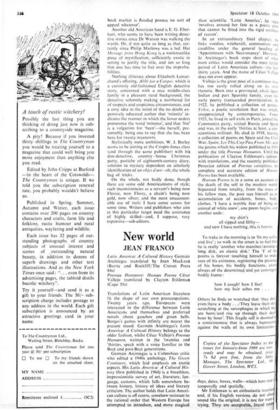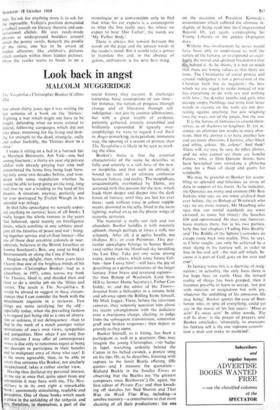New world
JEAN FRANCO
Latin America: A Cultural History German Arciniegas translated by Joan MacLean (Barrie and Rockliff /The Cresset Press 84s) Poemas Humanos: Human Poems Cesar Vallejo translated by Clayton Eshleman (Cape 55s) Translations of Latin American literature fit the shape of our own preoccupations. Twenty years ago, Europeans were interested in the difference between Latin Americans and themselves and preferred novels about gauchos and green hells. Borges's games with infinity are nearer the present mood. German Arciniegas's Latin America: A Cultural History belongs to the older fashion, whilst Cesar Vallejo's Poemas Humanos, written in the 'twenties and 'thirties, speak with a voice familiar to the Beat and post-Beat generations.
German Arciniegas is a Colombian critic who edited a 1940s anthology, The Green Continent, which laid emphasis on exotic aspects. His Latin America: A Cultural His- tory (first published in 1964) is a breathless, impressionistic survey of art, literature, lan- guage, customs, which falls somewhere be- tween history, history of ideas and literary criticism. The author holds that Latin Ameri- can culture is off centre, somehow resistant to the rational order that Western Europe has attempted to introduce, and more magical than scientific. 'Latin America', he says, `revolves around her fate as a poetic area that cannot be fitted into the rigid confines of reason'.
In an extraordinary final chapter, he links voodoo, witchcraft, communism and caudillos under the general heading of `Appointment with Necromancy'. However. Sr Arciniegas's book stops short of what most critics would consider the most fertile period of Latin American culture—the last thirty years. And the name of Cesar Vallejo does not even appear.
Vallejo is the great poet of a continent that has too easily rolled along on its cm n rhetoric. Born into a provincial, cholo (part Indian and part Spanish) family, even his early poetry transcended provincialism. In 1922, he published a collection of poems. Trike, a poetic revolution that was totally unappreciated by contemporaries. From 1923, he lived in self-exile in Paris, joined the Communist party, visited Russia and Spain and was, in the early 'thirties at least, a con- scientious militant. He died in 1938, leaving a collection of poems on Spain and the Civil War, Spain, Let This Cup Pass From Me, and the poems which his widow published in 1939 '=raider the title Poemas Humanos. Until the publication of Clayton Eshleman's edition. with translations, and the recently published Peruvian edition of Poesias completas, no complete and accurate edition of Human Poems has been available.
Human Poems is in a sense an account of the death of the self in the modern world. Separated from totality, from the mass of his fellow men, the poet sees himself as an accumulation of accidents, bones, body. clothes. 'I have a terrible fear of being an animal of white snow', one poem begins, and another ends : my shirt's all ripped and filthy— and now I have nothing, this is horror.
To wake in the morning is to 'fix my collar and live' ; to walk in the street is to feel that he is really 'another who marches/around a long disk, an elastic disk.' The 'I' of the poems is forever touching himself to make sure of his existence, registering the presence of his bones, his bodily functions, away always of the determined and yet contingen' bodily frame: how I cough! how I live! how my hair aches me . . .
Others he finds so wretched that 'they don even/have a body .../They leave their skin. scratching at the sarcophagus in which the are born/and rise up through their death hour by hour'. This fragile sell is doomed to a consciousness that is always hammerin' against the walls of its own limitations Copies of the Spectator Index to the issues for January-June 1969 are non ready and may be obtained, price 7s 6d post free, from the Sales Manager, The Spectator Ltd., 99 Gower Street, London, WCI.
days, dates, boxes, walls—which hem men temporally and spatially. • Mr Eshleman is an enthusiastic tranclal and, if his English versions do not alas sound like the original, it is not for want trying. They are acceptable, literal ren
ings. To ask for anything more is to ask for the impossible. Vallejo's position demanded a radical assault on literary rhetoric and con- versational clichés. He uses ready-made phrases as underground boulders around which the poetry swirls. Beneath the profile of the verse, one has to be aware of hidden allusions, like children's pictures which contain within them hidden pictures. Often the reader seems to break in on a monologue or a conversation only to find that what his ear expects is a counterpoint to what the line really says. So, where we expect to hear 'Our Father', the words are 'My Father Body'.
There is always this tension between the words on the page and the unseen words in the reader's mind. But it would take a genius to translate this and, in the absence of genius, enthusiasm is the next best thing.



































 Previous page
Previous page